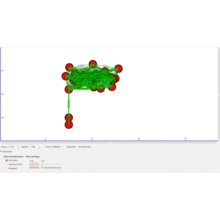Networking student research project ideas
Networking Student Research Project Topics that can enhance the value of your research endeavours are shared by us . By obtaining expert support from ns3-code.com, you can reduce the anxiety typically associated with the thesis writing process. Our team is committed to taking on the responsibility of thorough proofreading and editing, guaranteeing that your final work is polished and of the highest quality. Consequently, you can present your research with confidence, clarity, and precision, making a lasting impact on both readers and evaluators. Network Simulator 3 (NS3) is a free, open-source, discrete-event network simulation tool. We provide few NS3 project plans which are highly appropriate for students at different educational levels:
- Performance Analysis of Wi-Fi Protocols:
- Through the utilization of NS3, we plan to investigate and contrast the effectiveness of various IEEE 802.11 protocols such as 802.11b, 802.11n, 802.11a, and 802.11g in different settings.
- Simulating IoT Networks for Smart Cities:
- For applications in smart cities, our team aims to develop and examine a simulated IoT network model. Generally, crucial factors such as energy effectiveness, connectivity, and adaptability ought to be considered.
- Congestion Control Algorithms in TCP Networks:
- Under various network settings, we focus on examining the performance of different TCP congestion control methods like Reno, BBR, Tahoe, and Cubic.
- Impact of Mobility Models on MANET Performance:
- Mainly, concentrating on parameters such as packet delivery ratio and throughput, it is significant to investigate in what manner the effectiveness of Mobile Ad-hoc Networks (MANETs) are impacted by various mobility patterns.
- Quality of Service in Multimedia Transmission over 4G Networks:
- For transmission of multimedia in simulated 4G LTE networks, our team intends to evaluate the QoS metrics such as packet loss, latency, and jitter.
- Studying the Behavior of VANETs (Vehicular Ad-hoc Networks):
- Specifically, for security applications and traffic management, investigate vehicle-to-infrastructure (V2I) and vehicle-to-vehicle (V2V) interaction by simulating VANET settings.
- Energy Consumption in Wireless Sensor Networks:
- In wireless sensor networks, we plan to explore the energy utilization trends of sensor nodes. The influence of various routing protocols and network topologies should be considered.
- Network Security Protocol Simulation:
- Typically, in securing in opposition to usual assaults such as man-in-the-middle or DDoS, it is advisable to simulate and assess the performance of different network security protocols.
- SDN (Software-Defined Networking) Implementation Challenges:
- As a means to simulate an SDN platform, it is beneficial to employ NS3. The limitations in deploying SDN in various network infrastructures have to be investigated in an extensive manner.
- Performance of IPv6 over Different Network Scenarios:
- In different network settings, we aim to examine the benefits and effectiveness of IPv6 beyond IPv4. It could encompass routing, addressing, and safety factors.
- Underwater Wireless Communication Networks:
- Generally, underwater communication networks must be simulated. Their specific limitations like inadequate bandwidth and signal propagation postponements ought to be explored.
- Implementing Machine Learning for Network Traffic Analysis:
- For investigating and forecasting network traffic trends, our team plans to examine the utilization of machine learning methods in NS3.
- Cloud Computing Network Performance:
- The network performance factors of cloud computing platforms should be analyzed. Typically, credibility, data transfer speeds, and latency has to be considered.
- Satellite Communication Network Simulation:
- Concentrating on crucial factors such as inter-satellite links, orbital dynamics, and signal propagation, we intend to design and explore satellite communication networks.
best research topics
On the basis of your research domain, passions, and the modern tendencies and limitations within that field, the process of choosing the “best” research topics are determined. Among different domains, we suggest few widely significant and fascinating research topics:
Science and Technology
- The Future of Quantum Computing:
- The possible uses and limitations of quantum computing technology must be explored extensively.
- CRISPR and Gene Editing:
- Considering gene editing mechanisms, we plan to examine the judicial, moral, and societal impacts.
Health and Medicine
- Telemedicine and Healthcare Accessibility:
- In remote and underprivileged regions, our team focuses on exploring the influence of telemedicine on healthcare accessibility.
- Mental Health Effects of Social Media Usage:
- Specifically, amongst youngsters, we aim to investigate the connection among usage of social media and psychological welfare problems.
Environmental Studies
- Climate Change and Biodiversity:
- On environmental services and worldwide biodiversity, it is appreciable to explore the influence of climate variations.
- Sustainable Urban Planning:
- For environmentally-friendly and sustainable urban planning, our team intends to investigate efficient tactics.
Social Sciences and Humanities
- Impact of Globalization on Cultural Identity:
- In what manner regional cultural approaches and characteristics are impacted by enhanced worldwide connectivity ought to be examined.
- Media Representation and Gender Stereotypes:
- We plan to explore in what way gender principles and behaviors are affected by media representation.
Business and Economics
- Gig Economy and the Future of Work:
- On conventional work frameworks and employee rights, it is significant to analyze the impacts of the gig economy.
- Cryptocurrency and Financial Markets:
- The influence of cryptocurrencies has to be explored on worldwide financial models and management.
Education
- E-Learning vs. Traditional Learning Models:
- The performance of online learning environments must be contrasted with conventional educational courses.
- Innovative Teaching Methods in STEM Education:
- In order to enhance student involvement and interpretation, instruct STEM concepts by investigating novel techniques.
Engineering
- Renewable Energy Technologies:
- The creation of effective and sustainable renewable energy sources ought to be examined in an extensive manner.
- Smart City Technologies:
- In creating smart city architectures, we focus on exploring the utilization of AI and IoT.
Psychology
- Psychological Resilience in Adverse Situations:
- Considering the persons who they address the disturbing experiences, determinants which participate actively in resisting these issues must be examined.
- Cognitive Effects of Multitasking with Digital Media:
- In what manner perception, mindfulness, and remembrance are influenced by multitasking with digital media should be investigated.
Arts and Culture
- Digital Art and Its Impact on Traditional Art Forms:
- We focus on exploring in what manner conventional artistic approaches are converted by digital media.
- Cultural Impact of Global Cinema:
- On cultural norms and regional values, our team aims to investigate the impact of worldwide cinema.
Through this article, we have recommended numerous NS3 project plans which are applicable for students at different educational levels. Also, few broadly applicable and captivating research topics among different domains are offered by us in an obvious manner.
NS3 Student Research Project Ideas
NS3 Student Research Project Ideas that we highly recommend are listed below, we work on all these projects and much more so drop us a message to guide you at the best.
- Development of Fog based Dynamic Resource Allocation and Pricing Model in IoT
- Deep Reinforcement Learning for Fog Computing-based Vehicular System with Multi-operator Support
- Trade-off Model of Fog-Cloud Computing for Space Information Networks
- Energy-Efficient Proactive Caching for Fog Computing with Correlated Task Arrivals
- Leveraging fog and cloud computing for efficient computational offloading
- Applicability of Lightweight Groups to Fog Computing Systems
- A Contract-Based Computing-Charging Protocol for Electric Vehicles with Vehicular Fog Computing
- Energy-Efficient and Trustworthy Data Collection Protocol Based on Mobile Fog Computing in Internet of Things
- Latency Minimization with Optimum Workload Distribution and Power Control for Fog Computing
- A Multi-Stage Stochastic Programming-Based Offloading Policy for Fog Enabled IoT-eHealth
- Community-based allocation and migration strategies for fog computing
- Effective Utilization of Renewable Energy Sources in Fog Computing Environment via Frequency and Modulation Level Scaling
- Socially Aware Dynamic Computation Offloading Scheme for Fog Computing System With Energy Harvesting Devices
- A Cost Effective Architecture and Throughput Efficient Dynamic Bandwidth Allocation Protocol for Fog Computing Over EPON
- Software defined networking-based vehicular Adhoc Network with Fog Computing
- An Approach of Fog Detecting Magnitude Using Referenceless Perceptual Image Defogging
- Efficient CCA2 Secure Flexible and Publicly-Verifiable Fine-Grained Access Control in Fog Computing
- Multiattribute-Based Double Auction Toward Resource Allocation in Vehicular Fog Computing
- Crowd V-IoE: Visual Internet of Everything Architecture in AI-Driven Fog Computing
- An Efficient Approach Towards Surrogate Node Selection For Container Migration In Fog Computing

 Click Here to watch our latest output video using NS3 simulator
Click Here to watch our latest output video using NS3 simulator  Click Here to watch our latest projects screenshots using NS3 simulator
Click Here to watch our latest projects screenshots using NS3 simulator